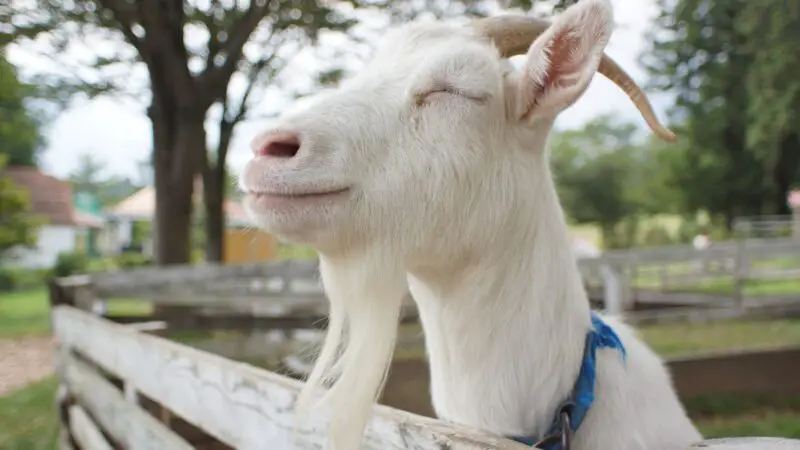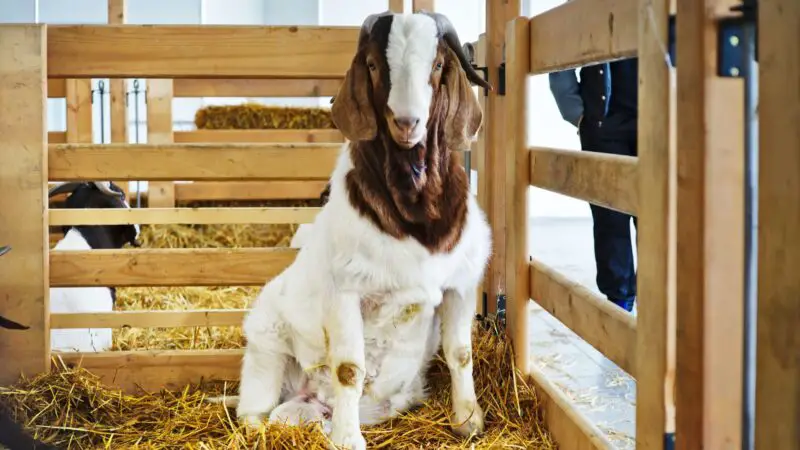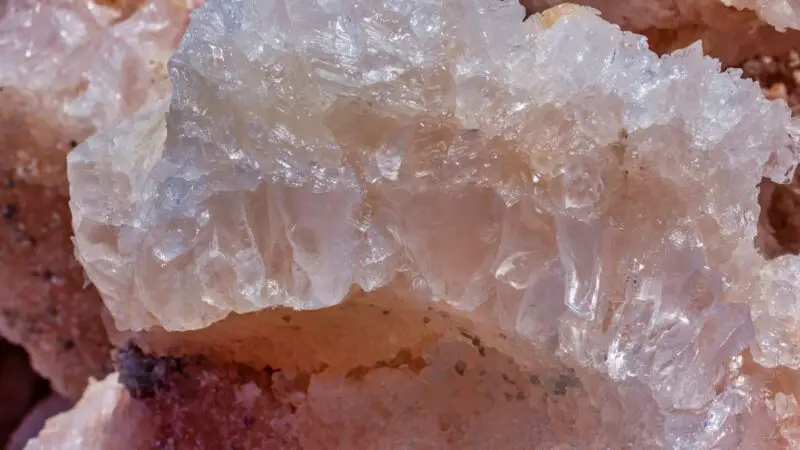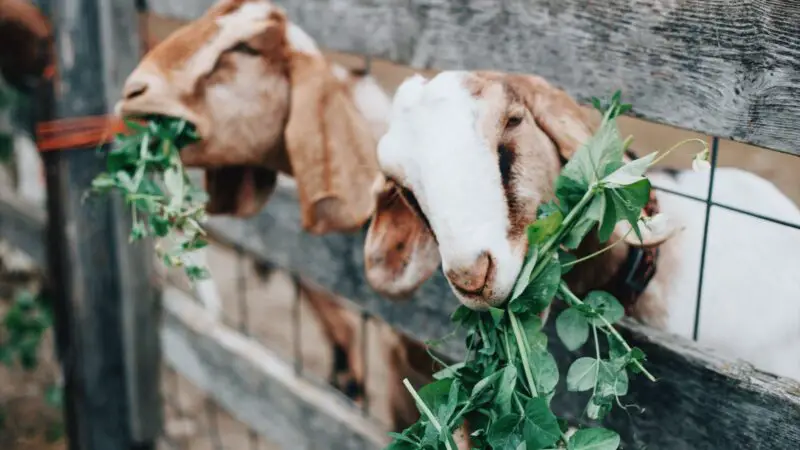Raising healthy goats requires providing them with the essential minerals they need to thrive. In this article, we’ll delve into the importance of minerals, the different forms they come in, and how to ensure your goats are getting the right balance. Let’s dive in and explore the world of goat nutrition!
Goats need essential minerals like calcium, phosphorus, magnesium, potassium, sodium, chlorine, sulfur, iron, zinc, manganese, copper, iodine, and selenium to support their overall health, growth, and reproduction. These minerals are crucial for maintaining a healthy and balanced diet.
By reading on, you’ll gain valuable insight into the various forms of minerals, how to feed them to your goats, and tips on keeping your furry friends healthy and happy. Let’s get started!

Why Do Goats Need Minerals?
Goats need minerals for a variety of reasons. These include maintaining strong bones, producing high-quality milk, ensuring proper digestion, and supporting reproductive health. Minerals also play a vital role in the proper functioning of the immune system and help goats resist disease and infection.
What Hinders Your Goats From Getting the Minerals They Need?
Various factors can hinder your goats from receiving the necessary minerals. These include poor-quality forage, unbalanced feed, and a lack of appropriate mineral supplementation. Soil type and local geography can also impact the mineral content of the plants your goats consume.
Why Do Goats Need Goat Minerals?
Goats require specific minerals in their diet to thrive. Regular livestock minerals may not provide the right balance needed for goats, so it’s essential to choose goat-specific minerals to ensure they receive the appropriate nutrients. Goat minerals are formulated with the unique needs of goats in mind, taking into account their specific dietary requirements and physiological differences from other livestock.
What Form of Goat Minerals Should You Use?
Goat minerals come in various forms, including loose minerals, mineral blocks, and pelleted supplements. Each form has its benefits and drawbacks. Loose minerals are easy for goats to consume and allow for better control of intake. Mineral blocks can last longer and are more resistant to weather. Pelleted supplements can be mixed into feed for easy consumption. Consider your goats’ preferences, accessibility, and the overall management of your herd when choosing the best form of minerals for your goats.
How Do You Feed Goat Minerals?

Feeding goat minerals depends on the form you choose. For loose minerals, provide a dedicated mineral feeder or small, shallow containers. For mineral blocks, place them in a weather-resistant holder or secured area where goats can easily access them. If using pelleted supplements, mix them into your goats’ daily feed according to the manufacturer’s recommendations.
What Does Goat Mineral Do?
Goat mineral supplements provide essential nutrients that support growth, reproduction, milk production, and overall health. They help fill nutritional gaps in your goats’ diet and ensure they receive the appropriate balance of minerals necessary for optimal health.
Which Goat Mineral Is Best?
There’s no one-size-fits-all answer to this question, as the best goat mineral depends on your goats’ specific needs and your local environment. Consider factors like the mineral content of your soil and forage, the age and stage of your goats, and any unique health concerns when selecting a mineral supplement. Consult with a veterinarian or local extension agent for recommendations tailored to your specific situation.
Can Goats Eat Too Many Minerals?
Yes, goats can consume too many minerals, which can lead to health issues like toxicity or imbalances. It’s crucial to provide the appropriate amount of minerals and monitor your goats’ intake to avoid overconsumption. Pay attention to any signs of mineral imbalances, such as changes in coat condition, appetite, or behavior.
How Much Mineral Do You Give Goats?
The amount of mineral supplement to provide your goats depends on factors like their age, size, and reproductive stage. Always follow the manufacturer’s recommendations for dosage and consult with a veterinarian if you’re unsure about the appropriate amount for your goats.
How Often Do Goats Need Minerals?
Goats should have continuous access to minerals, as their intake can vary depending on factors like weather, stress, and stage of growth or reproduction. Make sure to check and refill mineral feeders or replace mineral blocks as needed to ensure your goats always have access to the essential nutrients they require.
Do Goats Need a Salt Block?

While some goat minerals may include salt, it’s essential to provide a separate salt block to ensure your goats receive adequate sodium and chloride. Providing a salt block can also help regulate their consumption of other minerals, as they tend to consume more minerals when salt is lacking in their diet.
What Supplements Should I Give Goats?
In addition to minerals, goats may benefit from other supplements, such as vitamins, probiotics, and essential fatty acids. These supplements can help support your goats’ overall health, digestion, and immune function. Always consult with a veterinarian before introducing new supplements to your goats’ diet, as their specific needs may vary.
What Should Goats Eat Daily?

A well-balanced goat diet includes forage (hay or fresh pasture), a grain or concentrate mix, and access to clean water. Goats should also have continuous access to minerals and a salt block. The exact composition of their diet depends on factors like age, size, reproductive status, and whether they are dairy or meat goats.
Related: 6 Best Hay Feeders for Goats and Sheep | Check Before Buying
How to Keep Your Goats Healthy?
To keep your goats healthy, ensure they receive a balanced diet, proper mineral supplementation, and regular health checks. Provide them with clean, dry shelter and practice good herd management to prevent the spread of disease. Regular deworming, hoof trimming, and vaccinations are also essential aspects of maintaining goat health.
Related Questions
How Much Zinc Should I Give My Goat?
Zinc requirements for goats vary depending on factors like age, size, and reproductive status. Consult with a veterinarian or refer to the mineral supplement’s label for the recommended zinc dosage for your goats.
Related: Zinc Deficiency in Goats | Overlooked Symptoms and Reliable Remedies
How Often Can You Give Vitamin B Complex to Goats?
Vitamin B complex can be given to goats as needed, depending on their specific requirements. Consult a veterinarian for guidance on the appropriate frequency and dosage for your goats.
Does Goat Mineral Have Copper?
Most goat mineral supplements contain copper, as it is an essential nutrient for goats. However, the copper levels in mineral supplements can vary, so always check the label to ensure it meets your goats’ needs.
Are Mineral Blocks Good for Goats?
Mineral blocks can be a good option for goats, as they provide essential minerals in a form that’s easily accessible and weather-resistant. However, some goats may not consume enough minerals from a block or may have difficulty getting the proper balance. Be sure to monitor your goats’ mineral intake and consider providing loose minerals if necessary.
How Do You Give a Goat Mineral Block?
Place the mineral block in a weather-resistant holder or secure location where your goats can easily access it. Ensure the block remains clean and dry to encourage consumption and check regularly to see if it needs replacement.
How Do I Know if My Goats Need Copper?
Signs of copper deficiency in goats can include a rough coat, faded hair color, slow growth, anemia, and fertility issues. If you suspect your goats may need additional copper, consult with a veterinarian to confirm and discuss appropriate supplementation.
Is Baking Soda Good for Goats?
Baking soda (sodium bicarbonate) can be beneficial for goats, as it helps maintain a healthy rumen pH and prevent digestive issues like bloat. Providing a small container of free-choice baking soda can be a useful addition to your goats’ diet.
Final Thoughts
Providing your goats with the right balance of minerals is essential for maintaining their overall health and well-being. Understanding your goats’ specific needs and monitoring their mineral intake can help ensure they lead happy, healthy lives. Always consult with a veterinarian or local extension agent for personalized advice on your goats’ mineral requirements.
